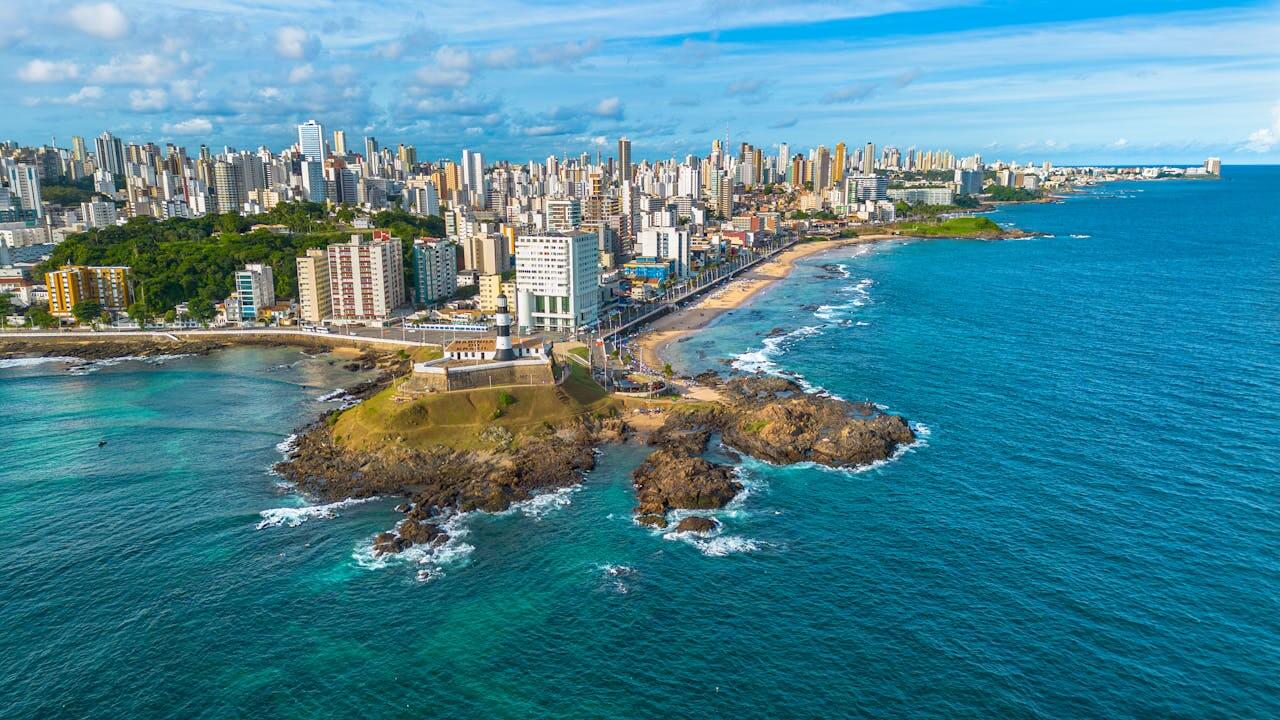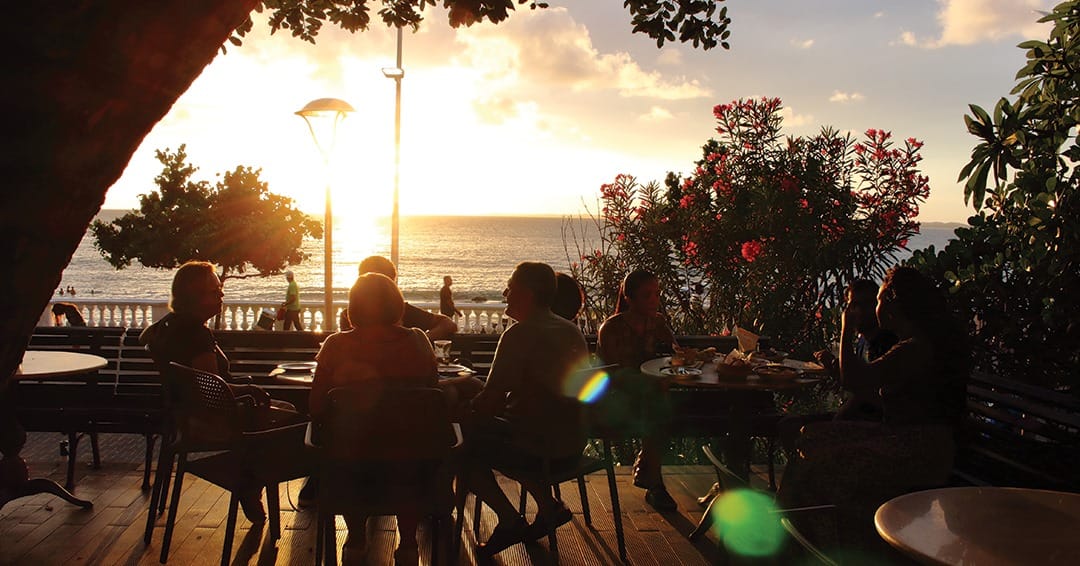
Salvador is an incredible city! A place where nature and urban life blend seamlessly, offering breathtaking landscapes, stunning beaches, vibrant culture, rich history, delicious cuisine, and warm, welcoming people.
Every year, thousands of international travelers choose Salvador as their destination in Brazil. However, the city still carries a stigma related to violence, often reinforced by stereotypes.
It’s common for people, especially Brazilians, to describe Salvador as a dangerous place, which can make tourists feel uneasy and ask if is Salvador Brazil safe.
But does this reputation truly reflect reality?
In this post, I’ll provide a realistic perspective on safety in Salvador, based on multiple reports—not just individual experiences—as well as official data.
To get straight to the point: Salvador can be considered a safe city. However, safety doesn’t depend solely on the destination—it also depends on you.
Your experience will be shaped by where you choose to stay, the places you visit, how you get around, and the precautions you take with your belongings.
Up next, we’ll dive deeper into these key aspects to help you enjoy your trip with peace of mind.
Check out this complete guide to Salvador, with tips on the best time to visit, how to get there, where to stay, what to do, and much more!
Let’s clear this up right away: Salvador is not a dangerous city for tourists who stay in safe neighborhoods and visit the more upscale areas of the Bahian capital.
Most of the violence in Salvador is concentrated in the outskirts, where it is closely linked to drug and arms trafficking.
Criminal organizations engage in territorial disputes, leading to urban conflicts and ongoing violence.
Additionally, police operations—some of which result in fatalities—also contribute to the city’s crime statistics. However, these incidents do not take place in tourist zones or high-end neighborhoods, as noted by Brazilian sociologist Antônio Lima.
These more violent areas are far from the main tourist districts, as confirmed by Ribeiro, coordinator of the Bahia Security Observatory Network, based on data from the Fogo Cruzado Institute.
Unfortunately, Salvador’s violence is deeply rooted in social inequality. The city struggles with high poverty rates, inadequate housing, and deficiencies in healthcare and education—factors that contribute to urban crime.
Tourist Safety in Salvador
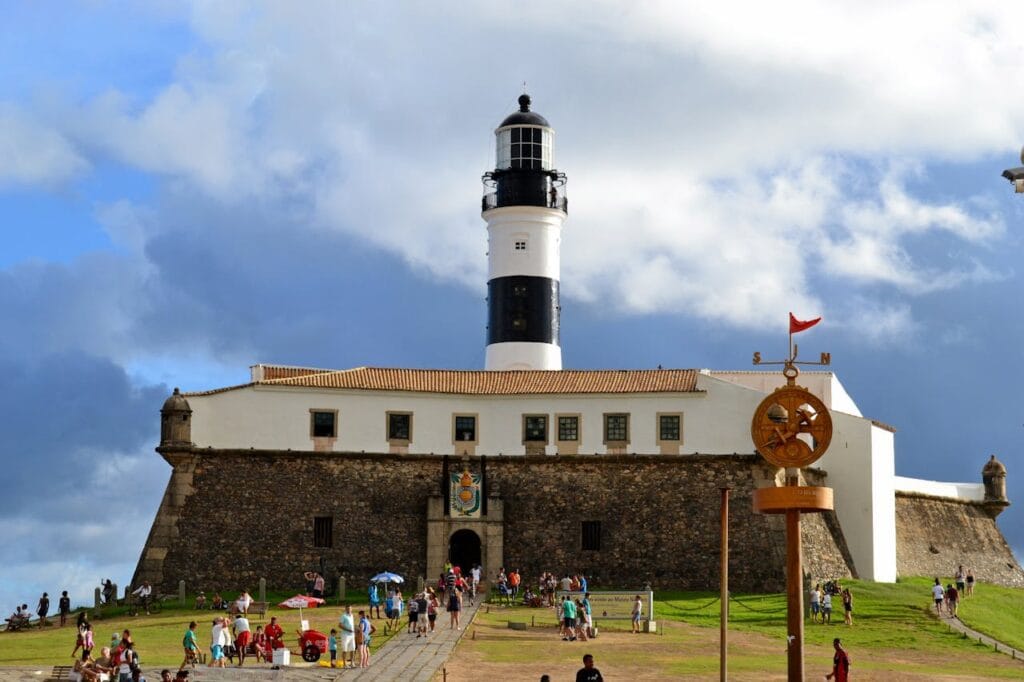
As mentioned earlier, violence in Salvador is primarily concentrated in the outskirts and rarely affects tourists who stay in safer areas.
Still, you might wonder why so many people warn about safety in the city.
The reason is simple: like any major tourist destination, Salvador is not immune to pickpocketing, phone snatching, scams, and minor opportunistic crimes—issues that also affect cities like Paris, London, New York, and Rome.
I’ve personally experienced similar situations while traveling:
- In Paris, two women attempted to steal my bag on the subway.
- In Rome, I was tricked by men dressed as Roman soldiers and ended up paying an outrageous amount for photos with them.
- In Florence, an older woman aggressively tried to sell me bracelets, placing them on my wrist and pressuring me until I managed to escape.
Despite the stereotypes, Salvador welcomes millions of visitors each year and remains one of Brazil’s most sought-after travel destinations.
Between January and July 2024, approximately 5.2 million tourists visited the city, according to data from Salvador’s Municipal Department of Culture and Tourism (Secult).
When it comes to Carnival, Salvador is one of the most popular and exciting destinations. With its famous street parades, and high-energy festivities, the city has become the top choice for Brazilian travelers during the holiday.
According to a Booking.com survey, Salvador ranks as the number one most desired Carnival destination in Brazil.
It’s clear that Salvador continues to attract millions of visitors, and while incidents can happen, they remain isolated cases. However, since your safety also depends on you.
Coming up, I’ll go over the most common scams and risks, along with essential tips to ensure you have a smooth and enjoyable stay in the city.
Sign up Now for the Best Travel Tips exploring Brazil!
Get expert travel tips, detailed itineraries, and insider recommendations for your trip.
Common Tourist Scams and Risks in Salvador
Below, you’ll find the most common scams and criminal activities that can happen to tourists in Salvador. Being aware of these will help you avoid them and enjoy your trip safely.
Common Scams:
1. Ribbon and Bracelet/Necklace Sellers
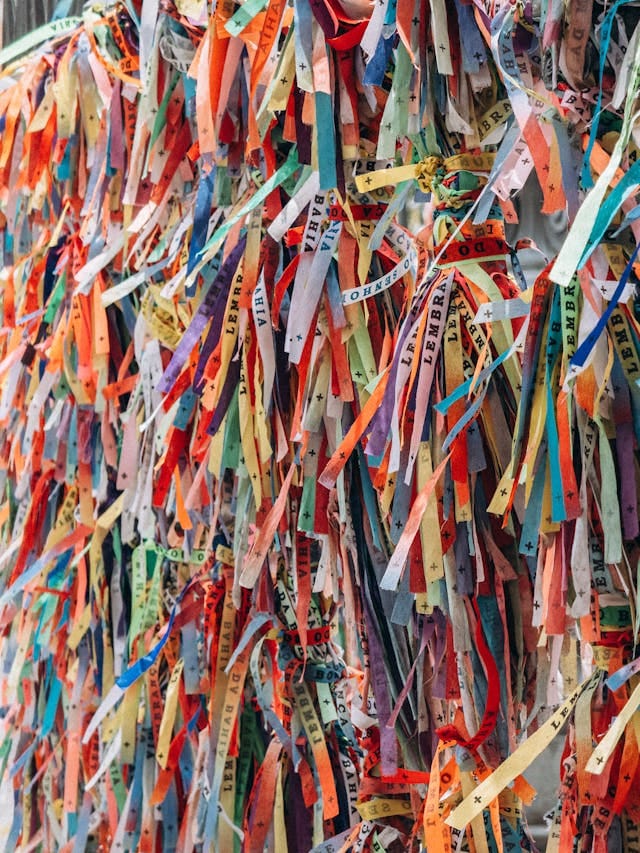
This is a classic way to lose money in Salvador! The moment you step into Pelourinho or visit places like the Church of Bonfim, numerous street vendors will approach you, trying to sell Bonfim ribbons, necklaces, keychains, and other souvenirs.
Beware! Some will tie a ribbon around your wrist before you can refuse or claim it’s free—only to demand payment afterward.
- If you genuinely want these items, ask for the price first to avoid being overcharged.
- If you’re not interested, politely decline and keep walking.
A safer option is to buy them from reputable places like the Mercado Modelo.
Rule of thumb: Nothing is free—if someone offers you something for “free,” expect to be charged later.
2. Photos with Baianas and Capoeira Performers
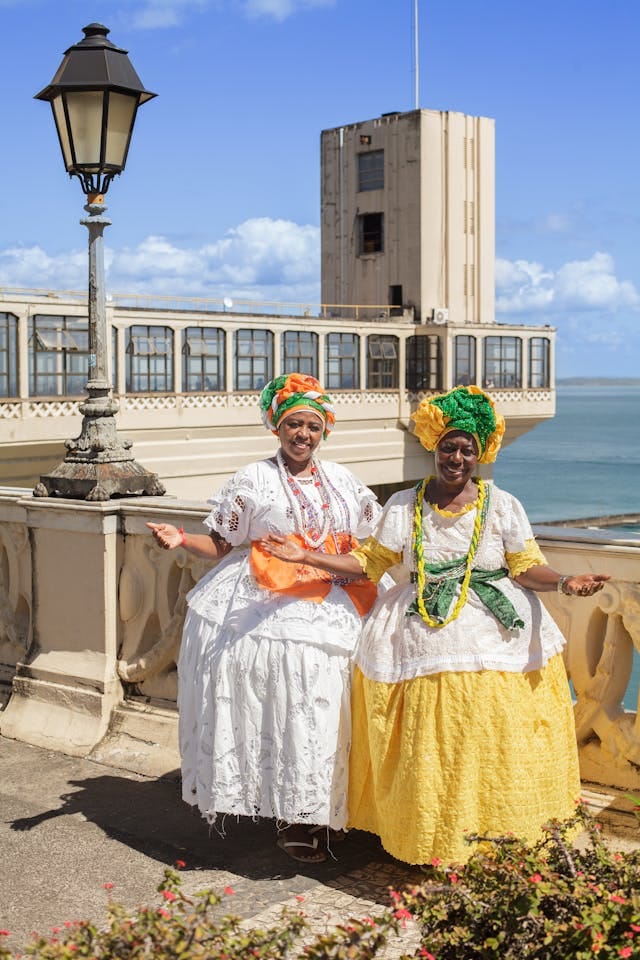
This scam is also well-known, especially in Pelourinho and other tourist spots. Women dressed in traditional Baiana outfits will approach you for a picture, acting friendly—only to charge you an excessive fee afterward.
Similarly, capoeira performers often demand money for photos.
- Always ask about the price beforehand if you’re interested.
- If you’re not, decline politely and walk away.
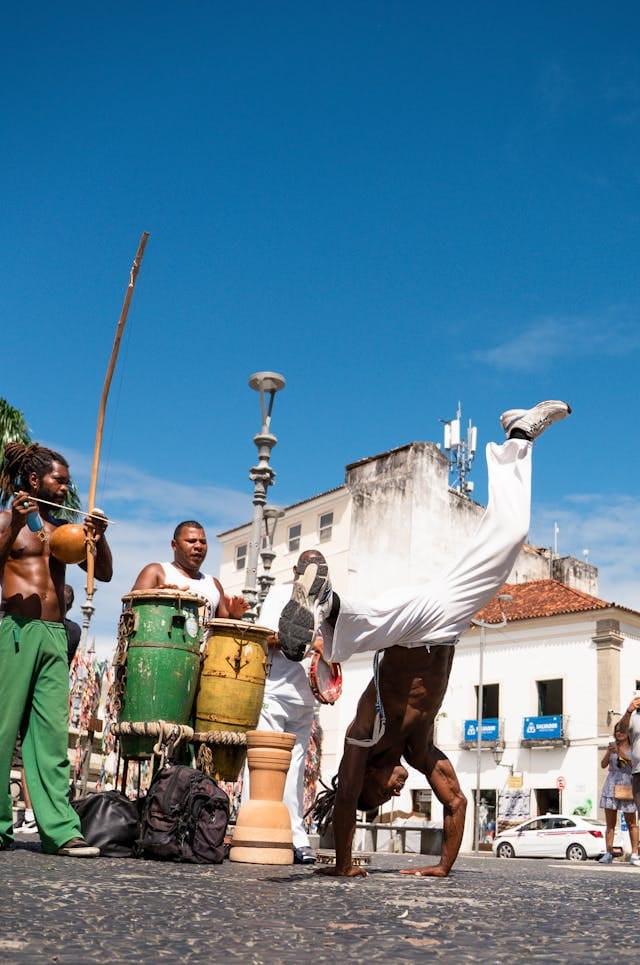
3. Fortune Tellers at Mercado Modelo & “Blessing” Baianas
At Mercado Modelo, some women claiming to be fortune tellers will start a friendly conversation and later demand money. If you’re not interested, it’s best to walk away quickly.
Another classic scam involves Baianas outside the Church of Bonfim, who offer to “bless” you with popcorn baths or herbs.
They will eventually ask for money, so if you don’t want this, stay alert and clarify the cost beforehand.
4. Body Painters in Pelourinho
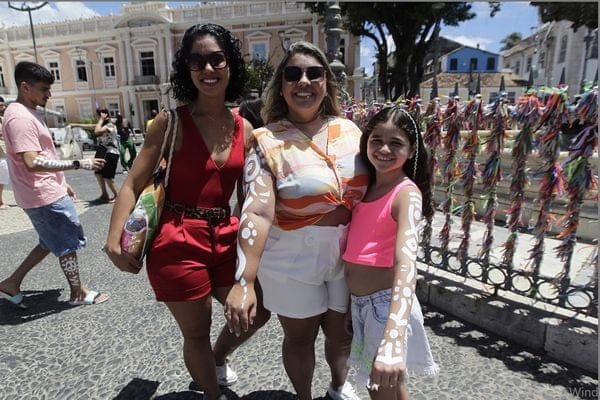
In Pelourinho, you’ll find body painters offering traditional Timbalada-style paintings, honoring Afro-Brazilian culture. Some are licensed and respectful, but others are not.
- Ask for the price before agreeing.
- Avoid engaging if they start painting without permission.
- Prices should range between R$10 – R$40, depending on the design. If someone charges more or refuses to state the price upfront, walk away.
Tip: Having these paintings on your arms can easily mark you as a tourist—something to keep in mind if you prefer to blend in.
5. Fake Tour Guides
In Pelourinho and other attractions, people may approach you pretending to be tour guides, giving information and later demanding a high fee.
To avoid this, book guides through trusted sources such as hotels, travel agencies, or reputable websites.
6. Illegal Transport at the Airport
Some drivers may offer expensive unofficial rides from the airport.
- If using Uber, book directly through the app.
- If taking a taxi, use registered taxis (look for official signage) and check the average fare beforehand.
If you ever feel unsafe, call the police.
Other Criminal Activities to Watch Out For
1. Pickpocketing
Be cautious in crowded tourist areas like Elevador Lacerda, Mercado Modelo, Pelourinho, and Santo Antônio Além do Carmo.
- Keep your valuables secure—never carry your wallet in an easily accessible pocket.
- Be especially careful when watching street performances, such as capoeira shows.
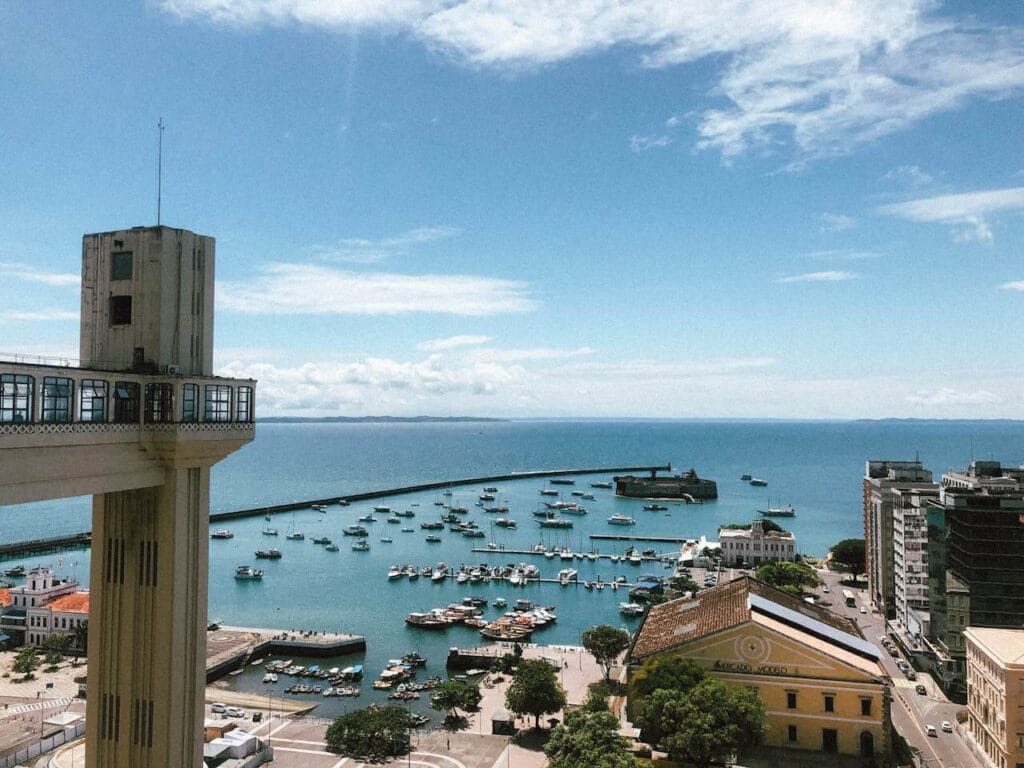
2. Chain & Phone Snatching
In Pelourinho, thefts involving necklaces and cell phones are common and are often carried out by teenagers.
The area has high police surveillance, with 30 security cameras and frequent patrols. However, on average, three incidents of theft or robbery are reported daily.
Many stolen items are recovered by the police, but it’s best to prevent theft in the first place.
How to Protect Yourself:
- Keep your phone out of sight and only use it in safe areas (e.g., inside shops or restaurants).
- Look around before taking photos to check for suspicious individuals.
- Use Uber/taxi apps in secure locations, not while standing on the street.
- Avoid wearing jewelry, watches, or expensive accessories.
If anything happens, seek out the nearest police officer or security personnel—they are usually present in high-tourism areas.

Safety Tips in Salvador
In addition to the precautions mentioned above, here are some extra measures to enhance your safety while visiting Salvador:
1. Where to Stay
Stay in the most tourist-friendly neighborhoods, such as Barra, Ondina, Corredor da Vitória, Rio Vermelho, Itapuã, Pelourinho, and Santo Antônio do Carmo.
Stay away from the periferias (outskirts), which in Salvador’s case are some of the poorest areas with high crime rates.
Below is a summary of the main tourist-friendly neighborhoods:
- Barra and Ondina: Considered some of the safest areas in Salvador. Police patrols are frequent, so you should be fine, but always use common sense (avoid walking with your phone in hand, wearing luxury accessories, or staying out too late).
- Rio Vermelho: Generally safe, but be cautious at night and avoid deserted streets.
- Corredor da Vitória: A more upscale neighborhood that is also considered very safe.
- Itapuã: Safe but less crowded. Be extra cautious, especially at night.
- Pelourinho and Santo Antônio do Carmo: Safe during the day due to strong police presence. However, always stick to busy streets. At night, only walk in well-lit, crowded areas. If using Uber, note that some streets are restricted to taxis and residents, meaning you may need to walk a few blocks to your accommodation.
A great tip is to check hotel reviews before booking, paying attention to feedback from previous guests regarding the location.
👉 Before booking, check our guide to the best areas to stay in Salvador — it helps you choose safe and convenient neighborhoods for your trip.
Then, find trusted accommodations in these areas on Hoteis.com, where you can filter by location, guest ratings, and safety reviews.
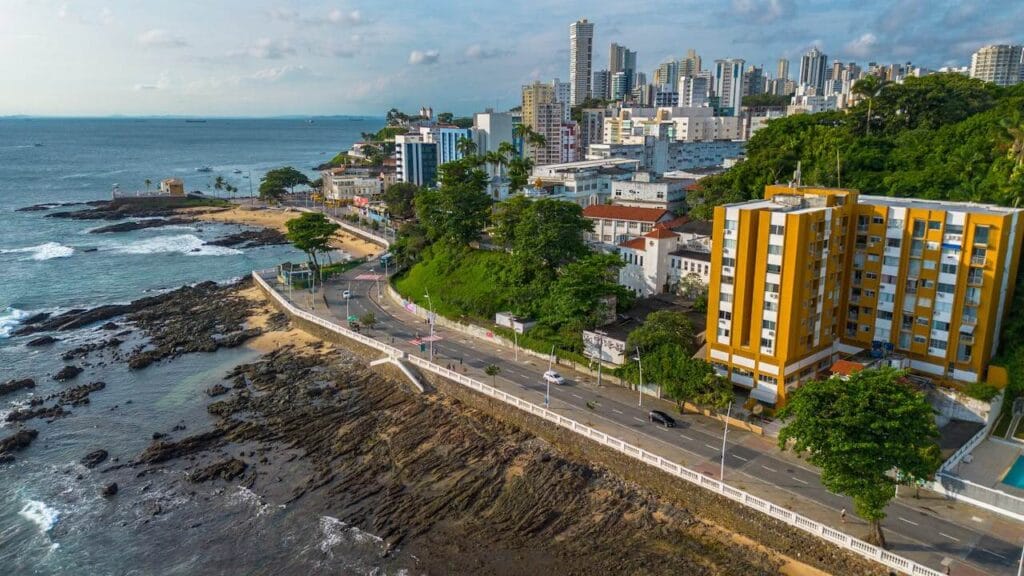
2. Transportation
Public transportation is not highly recommended in Salvador.
- Metro: Useful for getting from the airport to the city center but does not serve the main tourist areas.
- Buses: Not recommended for tourists, as they can be unsafe. Some say buses in touristy areas are fine, but if you feel unsafe, it’s best to avoid them.
- Uber: The most practical and safest way to travel between Salvador’s main attractions, such as Pelourinho, Barra, and Rio Vermelho. Rides are usually affordable, and paying through the app means you don’t need to carry cash.
- Taxis: A reliable alternative, especially late at night. They are available at hotels, shopping centers, and major tourist spots. Prices are slightly higher than Uber for short distances.
A useful tip: If you feel comfortable with a particular driver, get their contact information to arrange private transport for day trips or excursions.
3. Clothing and Accessories
- Avoid flashy clothing or accessories that might attract unwanted attention.
- Dress casually and do not display valuables, even in touristy or well-policed areas.
- If you are in a safe place (such as a restaurant or hotel), you can relax a bit more with your belongings.
4. Tour Guides
If you’re feeling unsure, especially if traveling alone, hiring a licensed tour guide or a reputable travel agency is a good idea. These professionals offer safe experiences at fair prices, and traveling in a group adds an extra layer of security.
👉 You can find trusted local tours on GetYourGuide — they work with verified guides and offer clear reviews from other travelers.
5. Historic Center Safety
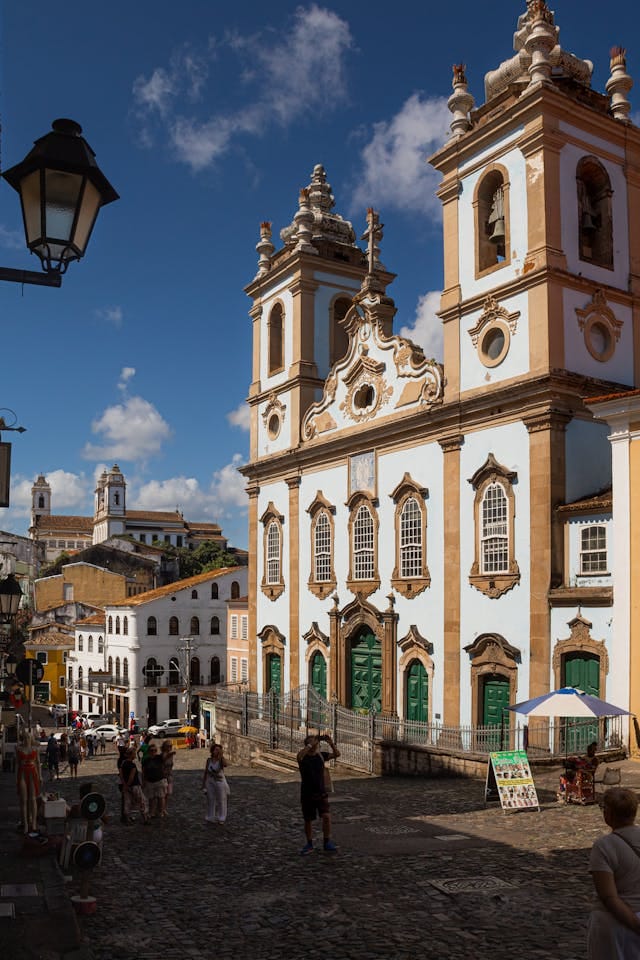
Avoid deserted streets and do not visit the area at night alone.
6. Money and Valuables
- Most hotels in Salvador have safes in their rooms. Use them to store passports, money, and valuables.
- Carry only small amounts of cash and store it in inner pockets or money belts.
- Money belts are a great option for keeping cash and cards safe.
7. Rental Cars
If you rent a car:
- Do not leave belongings visible inside the vehicle.
- Store luggage and shopping bags in the trunk or, preferably, at your accommodation.
8. Carnival Safety Tips
- Use a money belt or hidden pouch to store valuables in crowded areas.
- Carry as few items as possible to avoid unnecessary risks.
9. Beach Safety
- Never leave your belongings unattended on the sand. Ask a trustworthy-looking family to watch your things if necessary.
- Use lockers or take turns watching items when traveling in a group.
- Avoid city beaches and parks at night, unless they are crowded and well-lit.
10. If Something Happens
- Stay calm and do not resist. Handing over your belongings quickly reduces the risk of violence.
- Consider carrying a second wallet with a bit of cash and an old ID to give up in case of robbery. Some seasoned travelers also carry a second phone.
- Most criminals want quick cash and do not want trouble, so your safety should always come first.
11. Nightlife Safety
- For women and solo travelers: Stick with friends, don’t leave the bar alone, and trust your instincts about strangers.
- For everyone: Always take an Uber home at the end of the night—it’s worth the extra cost for safety.
- Stay in well-lit, busy areas: Stick to tourist-friendly neighborhoods like Pelourinho, Barra, and Rio Vermelho, especially at night.
- Avoid displaying valuables: Keep your phone, camera, and jewelry out of sight to avoid attracting unwanted attention.
- At night: Avoid walking alone in poorly lit or deserted areas. Use trusted transportation to get around after dark.
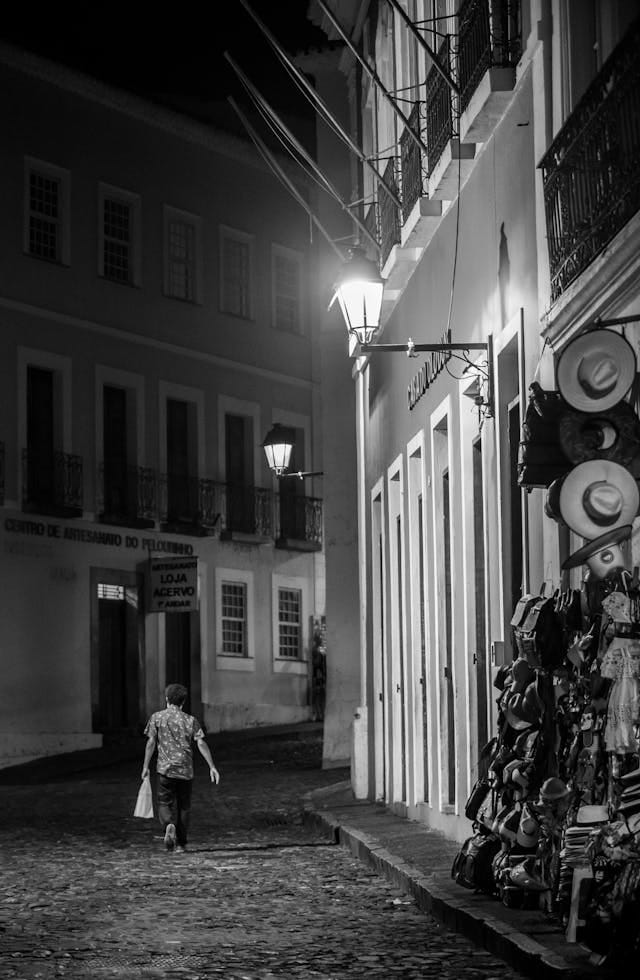
👉 For extra peace of mind, Travel Insurance Master helps you compare and personalize coverage for Brazil. Planning a longer stay? SafetyWing is ideal for digital nomads and extended trips.
Tourist Police Stations (DELTUR)
If you need, there are two Tourist Police Stations (DELTUR) in Salvador:
- Pelourinho – Largo do Cruzeiro de São Francisco, s/n, Pelourinho, Salvador-BA.
- Barra – R. Augusto Frederico Schmith, Chame-Chame, Salvador-BA, 40140-390.
These stations provide assistance to tourists and have bilingual officers who speak English, French, and Spanish.
Final thoughts: Is Salvador Brazil Safe?
Salvador is worth visiting — just stay aware, make smart choices, and you’ll have an amazing experience.
For inspiration on how to make the most of your trip, read our guide to the best things to do in Salvador.


